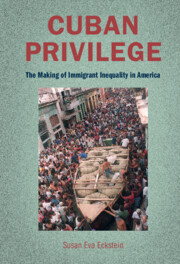Book contents
- Cuban Privilege
- Cuban Privilege
- Copyright page
- Dedication
- Contents
- Figures
- Preface
- Acronyms
- 1 The Making of Cuban Immigration Exceptionalism, 1959–1979
- 2 The Privileging of Cuban Immigrants in the United States, 1959–1979
- 3 The Immigration Crisis of 1980
- 4 Delinking Cubans from Haitians
- 5 Taking with One Hand, Giving with the Other
- 6 From Further Expansion to the Unraveling of Cuban Privileging amid Mainly Exclusion of Haitians
- 7 From Heaven to Hell under the Trump Administration
- 8 Exceptionalism in Practice?
- Index
1 - The Making of Cuban Immigration Exceptionalism, 1959–1979
Published online by Cambridge University Press: 19 May 2022
- Cuban Privilege
- Cuban Privilege
- Copyright page
- Dedication
- Contents
- Figures
- Preface
- Acronyms
- 1 The Making of Cuban Immigration Exceptionalism, 1959–1979
- 2 The Privileging of Cuban Immigrants in the United States, 1959–1979
- 3 The Immigration Crisis of 1980
- 4 Delinking Cubans from Haitians
- 5 Taking with One Hand, Giving with the Other
- 6 From Further Expansion to the Unraveling of Cuban Privileging amid Mainly Exclusion of Haitians
- 7 From Heaven to Hell under the Trump Administration
- 8 Exceptionalism in Practice?
- Index
Summary
The chapter briefly reviews general US immigration and refugee policy over the years. It then describes the Cuban revolution, and how and why Cubans who opposed it sought refuge in the United States, and how, in turn, the Eisenhower, Kennedy, Johnson, and Nixon administrations, successively, opposed to the anti-American radical turn of the revolution in the throes of the Cold War, offered Cubans unique immigration and resettlement entitlements. The “soft power” initiatives were intended to delegitimize Castro’s rule by demonstrating Cuban preference for capitalist democracy over Communism and by depleting Cuba of its human capital. In a “path dependent” manner the Presidents extended a string of entitlements, to address issues earlier entitlements generated or left unresolved, and new issues that evolved. The chapter also describes the failure of Washington’s one “hard power” effort to overthrow Castro, with the help of Cuban beneficiaries of “soft power” entitlements: the Bay of Pigs invasion. Neither the “soft” nor the “hard” power strategies kept Castro from consolidating the revolution.
Keywords
- Type
- Chapter
- Information
- Cuban PrivilegeThe Making of Immigrant Inequality in America, pp. 1 - 42Publisher: Cambridge University PressPrint publication year: 2022

